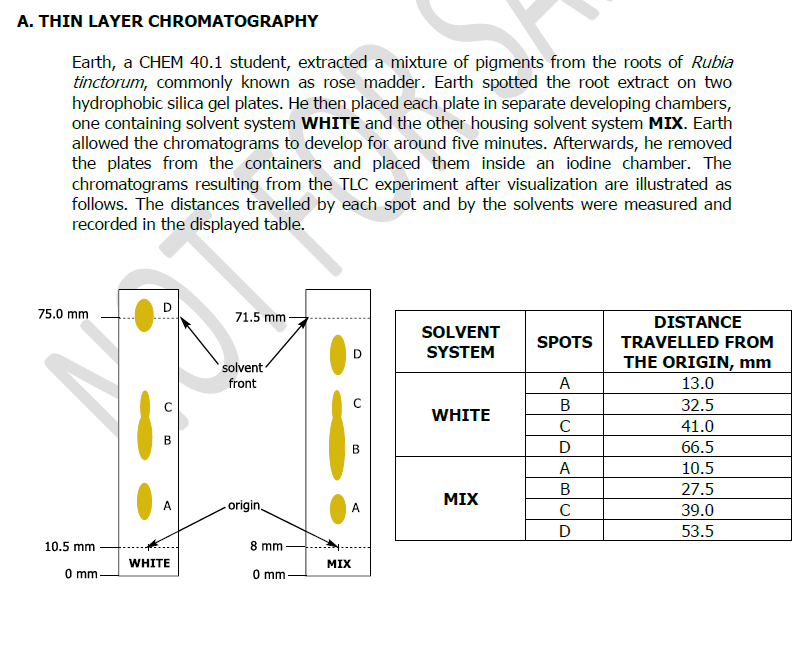Based on the resulting chromatograms after visualization with iodine vapor, which between the solvent systems WHITE and MIX resulted in a more effective separation of the pigments of the indigo extract? Explain your answer in terms of the solvent that did not effectively separate the components of the root extract.
Based on the resulting chromatograms after visualization with iodine vapor, which between the solvent systems WHITE and MIX resulted in a more effective separation of the pigments of the indigo extract? Explain your answer in terms of the solvent that did not effectively separate the components of the root extract.
Chapter4: Least-squares And Calibration Methods
Section: Chapter Questions
Problem 3P
Related questions
Question
Based on the resulting chromatograms after visualization with iodine vapor, which between the solvent systems WHITE and MIX resulted in a more effective separation of the pigments of the indigo extract? Explain your answer in terms of the solvent that did not effectively separate the components of the root extract.

Transcribed Image Text:A. THIN LAYER CHROMATOGRAPHY
Earth, a CHEM 40.1 student, extracted a mixture of pigments from the roots of Rubia
tinctorum, commonly known as rose madder. Earth spotted the root extract on two
hydrophobic silica gel plates. He then placed each plate in separate developing chambers,
one containing solvent system WHITE and the other housing solvent system MIX. Earth
allowed the chromatograms to develop for around five minutes. Afterwards, he removed
the plates from the containers and placed them inside an iodine chamber. The
chromatograms resulting from the TLC experiment after visualization are illustrated as
follows. The distances travelled by each spot and by the solvents were measured and
recorded in the displayed table.
D
75.0 mm
71.5 mm
DISTANCE
SOLVENT
SPOTS
TRAVELLED FROM
SYSTEM
solvent
THE ORIGIN, mm
front
A
13.0
В
32.5
WHITE
41.0
D
66.5
A
10.5
B
27.5
MIX
A
- origin,
A
39.0
D
53.5
10.5 mm
8 mm
WHITE
MIX
O mm-
O mm
Expert Solution
This question has been solved!
Explore an expertly crafted, step-by-step solution for a thorough understanding of key concepts.
This is a popular solution!
Trending now
This is a popular solution!
Step by step
Solved in 2 steps with 1 images

Knowledge Booster
Learn more about
Need a deep-dive on the concept behind this application? Look no further. Learn more about this topic, chemistry and related others by exploring similar questions and additional content below.Recommended textbooks for you


Principles of Instrumental Analysis
Chemistry
ISBN:
9781305577213
Author:
Douglas A. Skoog, F. James Holler, Stanley R. Crouch
Publisher:
Cengage Learning

EBK A SMALL SCALE APPROACH TO ORGANIC L
Chemistry
ISBN:
9781305446021
Author:
Lampman
Publisher:
CENGAGE LEARNING - CONSIGNMENT


Principles of Instrumental Analysis
Chemistry
ISBN:
9781305577213
Author:
Douglas A. Skoog, F. James Holler, Stanley R. Crouch
Publisher:
Cengage Learning

EBK A SMALL SCALE APPROACH TO ORGANIC L
Chemistry
ISBN:
9781305446021
Author:
Lampman
Publisher:
CENGAGE LEARNING - CONSIGNMENT